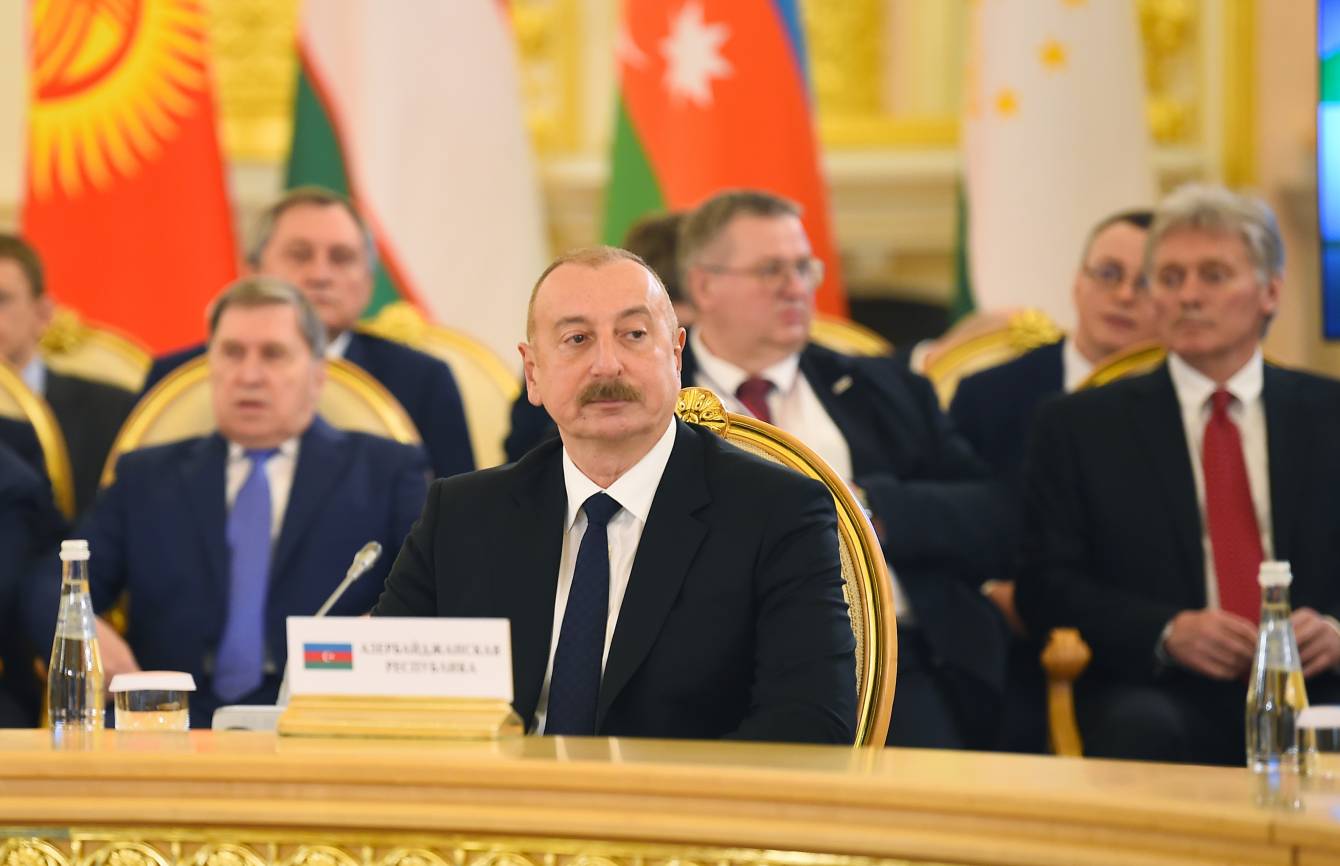President Ilham Aliyev has stated that Armenia’s refusal to recognize the territorial integrity of Azerbaijan has been the primary obstacle to reaching an agreement on other issues reflected in a peace treaty currently being negotiated between the two countries.
According to him, a change in Armenia’s stance on this matter can expedite the process of reaching a consensus to sign the long-protracted peace treaty.
“I think that after the recent statements of the Armenian leadership on the recognition of Karabakh as part of Azerbaijan, as well as the recognition of the territorial integrity of Azerbaijan, indicating specific figures for the total area of the Republic of Azerbaijan, the issue of agreeing on other points of the peace treaty will be much more seamless because this was the primary factor we could not come to an agreement on,” President Aliyev said Thursday in a meeting with Russian President Vladimir Putin in Moscow.
Earlier, President Putin described the mutual recognition of territorial integrities as the “main issue” that could give momentum to a broader agreement between Armenia and Azerbaijan. He said, “An agreement of a principled nature on the issue of territorial integrity is really the basis for agreeing on other rather secondary matters.”
Armenia and Azerbaijan have long been at odds over the latter’s Karabakh (Garabagh) region. Following the dissolution of the Soviet Union in 1991, Armenia launched a military campaign against Azerbaijan that lasted until a ceasefire deal was reached in 1994. As a result, Armenia occupied 20 percent of Azerbaijan’s internationally recognized territories. Over 30,000 ethnic Azerbaijanis were killed and one million were expelled from those lands in a brutal ethnic cleansing campaign carried out by Armenia.
On September 27, 2020, the decades-old conflict between the two countries escalated after Armenia’s forces, deployed in occupied Azerbaijani lands, shelled military positions and civilian settlements of Azerbaijan. During counter-attack operations, Azerbaijani forces liberated over 300 settlements, including the cities of Jabrayil, Fuzuli, Zangilan, Gubadli, and Shusha, from nearly 30 years of illegal Armenian occupation. The war concluded with a statement signed on November 10, 2020, under which Armenia returned the occupied Aghdam, Kalbajar, and Lachin districts to Azerbaijan.
Certain parts of Azerbaijan's Karabakh region are currently inhabited by approximately 25,000 people of Armenian origin, monitored by a temporary Russian peacekeeping mission. Shortly after the war, the government of Azerbaijan expressed its readiness to reintegrate these individuals into Azerbaijani society in accordance with the country’s Constitution and laws.
Armenia had been demanding so-called “status” and “self-determination” rights for these people. Baku rejected such demands as an intervention in Azerbaijan’s internal affairs and reaffirmed that Armenians living in the Karabakh region are Azerbaijani citizens. Azerbaijan considers the involvement of any third party in resolving issues related to their rights and security as unacceptable.
Meanwhile, Armenia’s Prime Minister Nikol Pashinyan signaled a change in Yerevan’s approach to Azerbaijan’s territorial integrity this week. During a press conference on Monday, he announced that Armenia recognizes Azerbaijan’s territorial integrity.
“Armenia recognizes Azerbaijan’s territory of 86,600 square kilometers, assuming that Azerbaijan is willing to recognize the territorial integrity of Armenia’s 29,800 square kilometers. Azerbaijan’s 86,600 square kilometer territory includes Nagorno-Karabakh [Karabakh],” TASS quoted Pashinyan as saying.
During an expanded meeting of the Supreme Eurasian Economic Council in Moscow on Thursday, PM Pashinyan reiterated that Armenia and Azerbaijan have agreed to mutually recognize each other’s territorial integrity. According to him, there has been “significant progress” on this basis.
However, within the same speech, the Armenian premier reversed his positive tone by accusing Azerbaijan of the alleged “blockade” on the Lachin road, which connects Armenia with the Armenian residents living in the Karabakh region of Azerbaijan.
In response, President Aliyev clarified to Pashinyan that the Lachin road is operating without hindrance under the control of a border checkpoint installed by Azerbaijan on the state border with Armenia, in accordance with all international standards.
“This border checkpoint is located 20 meters from the post of the Russian peacekeeping contingent. And today, through this border checkpoint, residents of Azerbaijan of Armenian origin, who live in Karabakh, can freely move toward Armenia. There are no obstacles, including those for patients whom the Red Cross transports and ambulances from the city of Khankendi,” President Aliyev said.
Recent video footage circulating on social media shows Armenian residents of the Karabakh region passing freely through the checkpoint. The only short pause in their movement is a standard passport control procedure conducted by Azerbaijani border guards. Convoys of the International Committee of the Red Cross also use the road without hindrance.







 The Mine Action Agency of Azerbaijan (ANAMA) reported on Thursday the discovery of a significant amount of explosives in the Khojavand district of ...
The Mine Action Agency of Azerbaijan (ANAMA) reported on Thursday the discovery of a significant amount of explosives in the Khojavand district of ...
 Iran has refuted reports of alleged damage to Shimon Peres Negev Nuclear Research Centre located southeast of Dimona, Israel, during the recent air...
Iran has refuted reports of alleged damage to Shimon Peres Negev Nuclear Research Centre located southeast of Dimona, Israel, during the recent air...
 Iran’s Foreign Minister, Hossein Amir-Abdollahian, has labeled a foiled Israeli drone attack in certain parts of the country as a "failure" for Isr...
Iran’s Foreign Minister, Hossein Amir-Abdollahian, has labeled a foiled Israeli drone attack in certain parts of the country as a "failure" for Isr...



